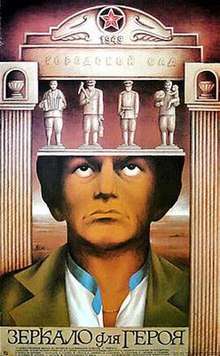Mirror for a Hero
Mirror for a Hero (Russian: Зеркало для героя, romanized: Zerkalo dlya geroya) is a 1987 Soviet two-part science fiction drama film directed by Vladimir Khotinenko based on the short story of the same name by Stanislav Rybas.[2]
| Mirror for a Hero | |
|---|---|
 | |
| Directed by | Vladimir Khotinenko |
| Written by | Nadezhda Kozhushanaya |
| Starring | Sergey Koltakov Ivan Bortnik |
| Music by | Boris Petrov |
| Cinematography | Evgeniy Grebnev |
Production company | |
Release date |
|
Running time | 130 minutes |
| Country | Soviet Union |
| Language | Russian |
Plot
Metropolitan psychologist-linguist Sergei Pshenichny (Sergey Koltakov), soon after quarreling with his father (Felix Stepun) on ideological grounds, meets with former mining engineer Andrei Nemchinov (Ivan Bortnik), who recently returned from prison, at a concert by the rock band Nautilus Pompilius.
After the concert, Sergei and Andrei, passing through the city park, see that a film shooting is taking place, about the post-war time. To get a better look at what is happening on the set, they decide to climb over the park fence, but hit some cable lying on the ground and get transferred into the past — in the late 1940s.
But this test for Sergei and his random acquaintance does not end. Every time the night passes and morning begins, the day is always May 8, 1949.
Cast
- Sergey Koltakov as Sergei Pshenichny
- Ivan Bortnik as Andrei Nemchinov
- Felix Stepun as Kirill Pshenichny, the father of Sergei
- Boris Galkin as young Kirill Pshenichny
- Natalia Akimova as young Lida, the mother of Sergei
- Elena Golyanova as Roza
- Yakov Stepanov as Sashka the tanker (voiced by Avangard Leontiev)
- Viktor Smirnov as director of the mine Tyukin
- Nikolai Stotsky as miner Fyodor Petrenko
- Sergey Parshin as Stakhanovite miner Pukharev
- Alexander Peskov as policeman Ryabenko
- Elena Kozlitina as Sergei's wife
Production
Filming took place in the city of Donetsk, and in Donetsk (villages of Abakumov, Karl Marx, Makeyevka, Kurahivka) and Voroshilovgrad (village of Bokovo-Platovo) oblasts.[3]
Awards and nominations
The film's screenwriter Nadezhda Kozhushanaya was nominated for the Nika Award for Best Screenplay in 1988,[4] while director Vladimir Khotinenko received the Special Jury Prize for the film at the All-Union Film Festival in Baku in 1988[5] and the Vittorio De Sica Prize in Italy in 1989.[6][7]
References
- Arkus, Lyubov (ed.). "Зеркало для героя". Encyclopedia of Domestic Cinema (in Russian). Seans. Archived from the original on 2011-11-29.
- "Зеркало для героя". Encyclopedia of Cinema (in Russian). 2010. Retrieved 2019-05-29 – via art.niv.ru.
- "Зеркало для героя". Vokrug TV (in Russian). Retrieved 2019-05-29.
- "Номинанты Национальной кинематографической премии «НИКА» за 1988 год". kino-nika.com (in Russian). Nika Award. Retrieved 2019-05-29.
- Arkus, Lyubov (ed.). "ВКФ (Всесоюзный кинофестиваль)". Encyclopedia of Domestic Cinema (in Russian). Seans. Archived from the original on 7 January 2011.
- D'Agostini, Paolo (22 September 1989). "Sorrento incontra l'Italia". la Repubblica (in Italian). Retrieved 2019-05-29.
- "Premiati 1989". premivittoriodesica.it (in Italian). Vittorio De Sica Prize. Retrieved 2019-05-29.